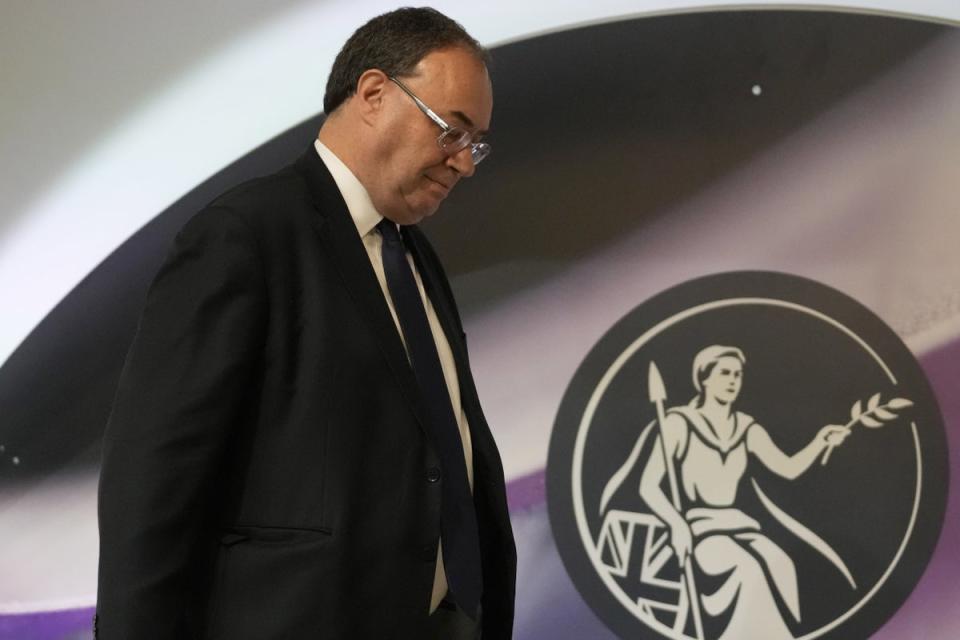Bank of England poised for interest rate rise as it fights inflation

What will the Bank of England do tomorrow?
Raise interest rates for sure, the question will be by how much. Does the Bank’s nine-strong rate setting Monetary Policy Committee (MPC) go for the expected 0.25 point rise, taking rates to 1.25%. Or does it go for something more dramatic?
What will influence its thinking?
It needs to do something to quell inflation. It has already moved rates up from 0.1%, which is where they were in December.
By common City consent it behind the curve, or it dropped the ball, or whichever metaphor you prefer.
Certainly, plenty of people, including then Bank chief economist Andy Haldane, were warning that an inflation train was coming around the corner, long before the Bank acted.
Why will putting rates up help?
It makes it more expensive to borrow, so people spend less. UK inflation is running at 9% and probably going higher. For the poorest households, inflation is reckoned to be about 14%.
Rates haven’t been higher than 1% since 2009, when Gordon Brown was Prime Minister.
Isn’t it also going to hurt growth?
Almost certainly, hence the Bank’s pickle. It has got itself into the unfortunate position where it is having to send rates up at just the point the economy is already slowing. Critics would say, if only it had moved rates up much sooner, starting maybe a year ago, it would now at least have something to cut and perhaps a smaller inflation issue in the first place.
What is America doing on this?
We will find out at 7pm tonight (Wednesday) by how much the Federal Reserve moved rates up.
A rise of 0.5 percentage points is expected, but it might be bolder and go for a 0.75 point increase.
When US inflation came in the other week at 8.5% it spooked the market. If the Fed does go for the bigger move, it would give the Bank of England some cover to do the same.
One risk is that the Bank does small moves while the Fed does big ones, and money flows from sterling into dollars, hurting the value of an already battered pound.
Any dissenting voices?
Not many. But here is former MPC member Danny Blanchflower writing in the Evening Standard on Tuesday: “Attempts to ‘solve’ the inflation problem through monetary tightening are likely to produce something more painful. A deeper, longer lasting recession than happened in 2008/9 where output fell 6% over five quarters is increasingly plausible. The OECD is already forecasting that growth in the UK in 2023 will be the next to slowest in the G20 after Russia and the reality may well be nastier.”
He thinks recessions hurt more than inflation. And adds, amusingly: “What is the use of a committee of nine if they all think the same?”
His piece is here: https://www.standard.co.uk/business/a-recession-is-worse-than-inflation-why-the-bank-is-getting-this-all-wrong-b1006037.html
Any other experts?
Andy Burgess of Insight Investment says: “With an economy that shrank in April and a Monetary Policy Committee (MPC) widely expected to raise interest rates to 1.25% on Thursday, the UK policy backdrop is starting to look increasingly complex. Any potential tax cuts may exacerbate inflationary concerns and together with quantitative tightening may put upward pressure on gilt yields as fiscal spending will need financing. In the meantime, market expectations for rate hikes are now to 3.0% by the end of the year; materially above the level the Bank of England viewed as required to hit their medium-term inflation target according to their most recent Monetary Policy Report. Any split in the votes away from 25bp by MPC members will therefore be carefully scrutinised.”

 Yahoo Finance
Yahoo Finance 